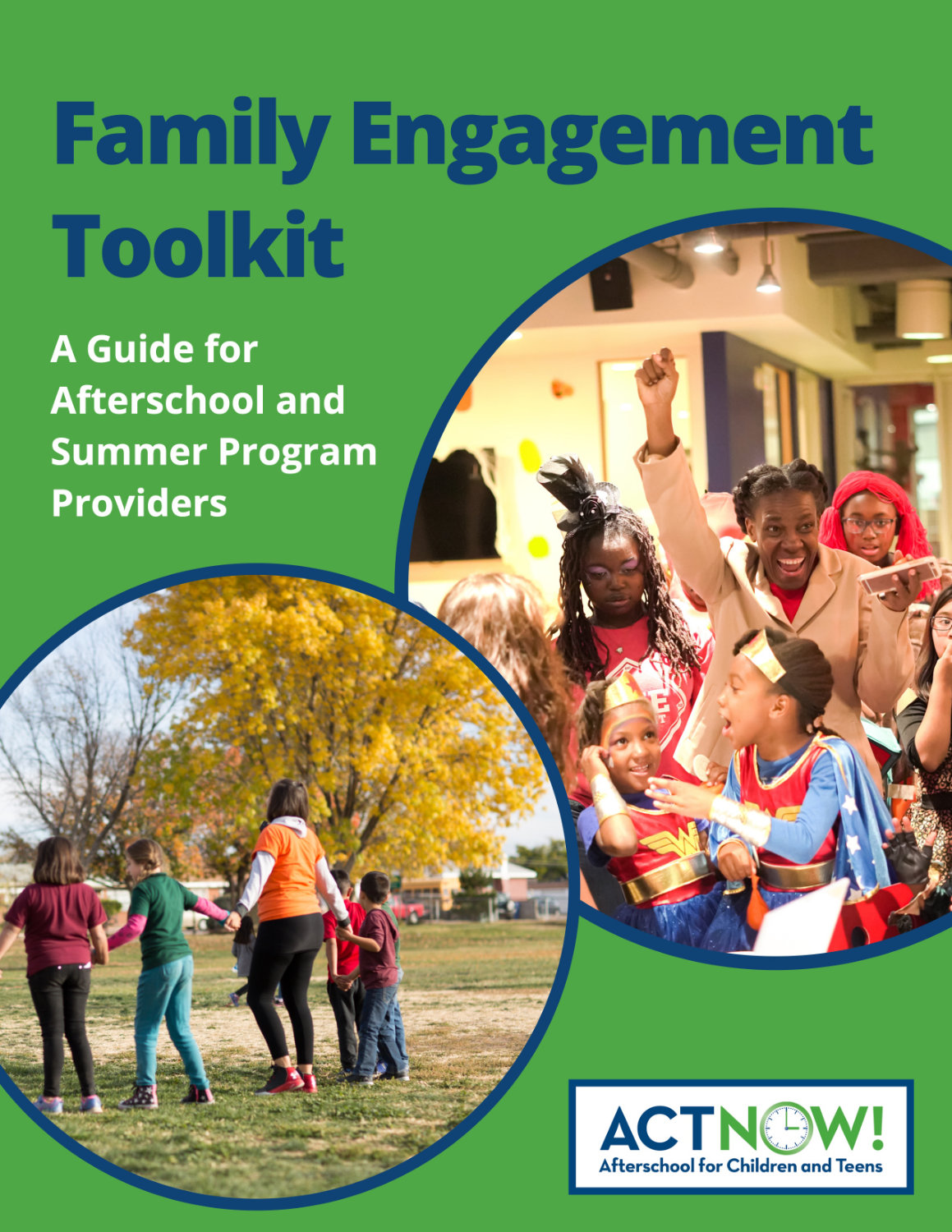Family Engagement Toolkit
Why Is Family Engagement Important?
- When families are involved in their children’s schooling, children do better.
- Afterschool programs are a gateway to school involvement for many parents who do not and would not otherwise feel connected to their children’s school. Parents who feel connected to their afterschool program are more likely to have contact with teachers and day school staff.
- Family engagement can also benefit programs by providing programs with valuable volunteer and advisor support from families.
ACT Now’s Family Engagement Toolkit
This Family Engagement Toolkit was developed by the Afterschool for Children and Teens (ACT Now) Coalition to aid afterschool and summer program administrators and staff as they navigate the family engagement process, regardless of their starting point. To help achieve this goal, ACT Now used the principles developed by the Illinois State Board of Education’s (ISBE) Family Engagement Framework while developing this toolkit.
ACT Now unveiled our newest resource, the Family Engagement Toolkit, during a live walkthrough of the tool on August 16, 2021. Access the RECORDING HERE!
Passcode: 4GSgvCC*
Strategies for Pursuing Family Engagement
- Welcome Parents: Make sure to welcome parents from the very first day and communicate that they are important and their involvement is critical to the program.
- Open Hour: Host a regular telephone hour or office hour where parents can call or stop by to ask questions or offer suggestions.
- Parents as Advocates: Train parents to educate policymakers, legislators, the media, and community members about the importance of afterschool programs. You can train parents to write advocacy letters (see Parent Letter to Legislators Handout), make phone calls to legislators, or make legislative visits. You can also hold trainings to communicate information about substantive policy issues.
- Parent Handbook: Draft a Parent Handbook that covers everything parents would want to about your program.
- Parents as Employees: The next time you have a job opening or hear about a job opening in your community consider notifying parents.
- Parents as Volunteers: Parents can be a valuable asset as volunteers. However, not all parents can volunteer during program hours. If parents are unable to volunteer during the day, consider asking them to perform tasks that can be done off-site such as stuffing envelopes, contacting businesses for donations and support, or typing a newsletter. Create a volunteer bank list of parents early on in the year to ease access to volunteers when they are needed. Use the sample Parent Volunteer Recruitment Letter handout to assess the capacity of your parent volunteers.
- Parent Focused Programming: Use a survey, like the Parent Interest Survey handout, to assess what parents want to see out of the program. Consider offering programing to benefit the parents like a sewing, baking class, or adult education classes.
- Parents as Advisors: Ask parents and other caregivers to act as advisors to your program.
- Frequent Communication: Develop mechanisms for ongoing and frequent communication, such as using a newsletter, a website, phone tree, parent buddies, text messages, and Facebook.
- Service Referrals: Develop lists of local agencies that provide services, establish a Parent Resource Center, and compile a Resource Book to help parents locate information and services they need. This will also invest parents more in your program.
- Parents as Teachers: Find out what skills parents and families have to offer and find ways to leverage these skills in your programming.
Click here to download the PDF version.
*Some Content adapted from The After-School Corporation, http://www.expandedschools.org/sites/default/files/increasing_parent_family_engagement_in_after_school.pdf.
Other Resources
The Disengagement Gap in Schools and Education
This report from the Brooking Institute aims to elevate student engagement to not only combat chronic absenteeism but to help young people thrive in school and shares insights on both students’ and parents’ perspectives on their learning experiences.
Family Engagement and Literacy
Episode three of the Welcome-to-Teaching Conversation Series from ShareMyLesson discusses practical strategies for educators to connect with parents and enhance literacy-focused family engagement.
4 Things You Can Do Right Now to Promote Meaningful Participation in Afterschool
BOOSTCafe hosts a rotating blog where professionals in the field are able to share best practices for facilitating out-of-school time (OST) programs. This blog post highlights ways to engage students and families in OST.
Materials to Support Youth and Families
ShareMyLesson has several free collections of resources to welcome students back, support digital student learning, reinforce careers in skilled trades, inspire changemakers, and engage families.
Chicago Public Schools Supplies Pick Up and Events
Chalkbeat Chicago has listed events throughout Chicago where students and families can gather, celebrate the start of the school year, and pick up free school supplies.
BOOST Cafe Welcome Back eCards
BOOST Cafe has created several free eCards that providers can send to staff, families, and youth in your program to welcome them back to programming!
7 Ways to Promote Positive Communications With Families
Read about seven ways to promote positive communication with families, teachers, and afterschool programs.
PTA Facilitating Listening Sessions Toolkit: The National PTA has developed a toolkit for educators and afterschool providers to utilize when engaging families in community. The Facilitating Listening Sessions Toolkit outlines the strategies for hosting a listening session in your community, hosts invitation scripts, and even an agenda for the facilitator of the conversation.

